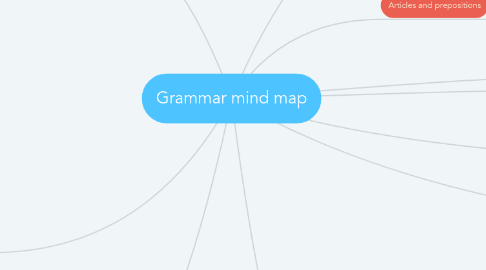
1. Adjectives and Adverbs
1.1. Definition
1.1.1. Adjectives describe nouns and pronouns.
1.1.1.1. He is an old man.
1.1.1.2. She plays piano very well.
1.1.1.3. My bedroom is very clean.
1.1.2. Adverbs describe or modify verbs, adjectives, or other adverbs.
1.1.2.1. The boy does his homework very carefully.
1.1.2.2. He is often hungry.
1.1.2.3. I usually help his father in the kitchen.
1.1.3. Why information is useful?
1.1.3.1. Adjectives and adverbs can show more details about the nouns or other activities.
2. Roots, Prefixes, and Suffixes
2.1. Definition
2.1.1. Prefixes:Used to change the meanings of words.
2.1.1.1. Roots:English is based on Latin, but many words have been borrowed from other languages.
2.1.1.1.1. alter=other alter, alternative, alternate.
2.1.1.1.2. am+love amateur, amicable, amorous.
2.1.1.1.3. cent=hundred century, percent,cent.
2.1.1.2. agree, disagree
2.1.1.3. view, review
2.1.1.4. understand, mis understand
2.1.2. Suffixes:Add to the end of a root and, like prefixes, they change the meanings of words.
2.1.2.1. care-careless-carelessness
2.1.2.2. able-disable
2.1.2.3. polite-impolite-impoliteness
2.1.3. Why information is useful?
2.1.3.1. It is very helpful to expand vocabulary and become fluent in a language.
3. Active and Passive Voice
3.1. Definition
3.1.1. Active: The subject is doing the action.
3.1.1.1. He calls me now.
3.1.1.2. She hound her pen in her bag.
3.1.1.3. I do this job by myself.
3.1.2. Passive Voice: The subject is acted upon.
3.1.2.1. The phone has been found.
3.1.2.2. My friend was born in China.
3.1.2.3. He was watched by his mom.
3.1.3. Why information is useful?
3.1.3.1. Active and passive voice can clearly show the relation between subject and verb.
4. Why information is useful?
5. Past-something happen after present.
5.1. They ran away from the school.
5.2. He was busy yesterday.
5.3. I was tired last night.
6. Definition
6.1. The is used with nouns that something or someone definite or specific.
6.1.1. I like reading the book.
6.1.2. She likes the cat.
6.1.3. The river is two thousand miles long.
6.2. A and an are used with singular nouns.
6.2.1. I want to buy a cup of tea.
6.2.2. I can give you an apple.
6.2.3. She has an iPhone.
7. The preposition plus its object is called a prepositional phrase.
7.1. The pen is on the desk.
7.2. The lady stands behind me.
7.3. My pants are under my bed.
8. Prepositions connect nous and make sentence more clearly, fluency, and specific.
9. Articles and prepositions
10. Verb tenses and irregular forms
10.1. I will play football this night.
10.2. Definiton
10.2.1. Present- something happen right now.
10.2.1.1. We often play in the playground.
10.2.1.2. He gets up at 6 a.m.
10.2.2. I have many books.
10.2.3. Future-something happen in the further.
10.2.3.1. He will finish his homework.
10.2.3.2. I am going to read my book this night.
10.2.4. Past perfect-the situation was completed by the time another past event occurred.
10.2.4.1. He had done something wrong.
10.2.4.2. He had had breakfast.
10.2.5. Present perfect-something happen after present.
10.2.5.1. Father had done more research.
10.2.5.2. Have you found your pen yet?
10.2.5.3. He has turned off the light.
10.2.5.4. He has lived here since 1978.
10.2.6. Future perfect-an action will happen in a time in future.
10.2.6.1. By the time you reach the station, the train will have left.
10.2.6.2. I will have eaten up my meal before she comes back.
10.2.6.3. He will have learned ten thousand words by the end of this year.
10.2.7. Why information is useful?
10.2.7.1. Tenses can show what event happen first and what is next.

